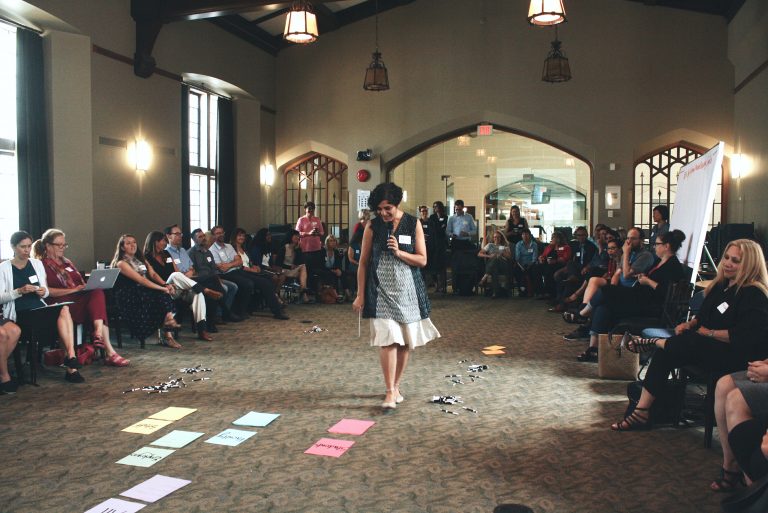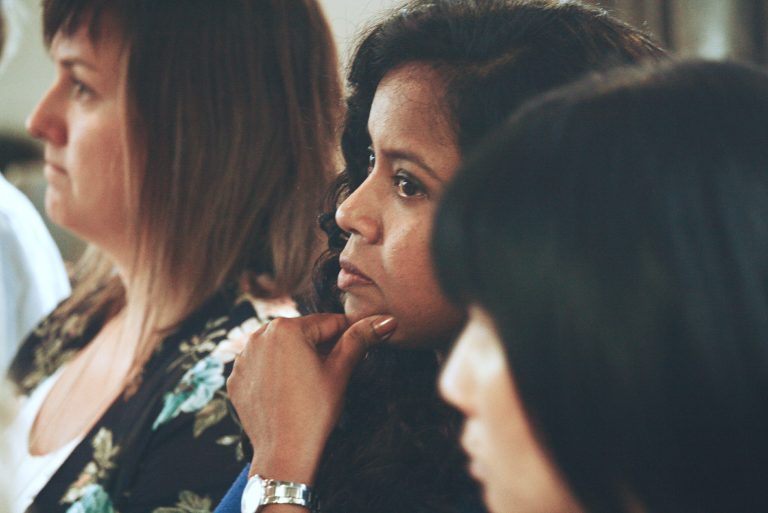Equity & Inclusion Office is working to improve conflict engagement capacity at UBC.
While conflict amongst individuals and groups may be commonplace, it’s how conflict is addressed that can make all the difference. Improving conflict engagement practices is key to UBC’s efforts to create a more respectful, inclusive, productive, and creative environment.

Aftab Erfan, Director of Dialogue and Conflict Engagement with the Equity & Incluion Office, guides workshop participants through an interactive exercise.
“We don’t currently have an institutional framework for conflict engagement at UBC so my role is to work with university partners to create a strategic vision for dealing with differences on our campuses. It will allow us to better coordinate efforts, improve practices and overall make best use of our capacities,” says Aftab Erfan, Director of Dialogue and Conflict Engagement with the Equity & Inclusion Office.
To help create a shared understanding of institutional conflict engagement efforts and provide space for feedback on the draft framework, the Equity & Inclusion Office convened a workshop to engage staff, faculty and students for whom conflict engagement is a major aspect of professional life.
Workshop discussions confirmed the need for the university to continue with an integrated approach to conflict engagement. They highlighted the importance of bringing together prevention and dialogue initiatives with disciplinary and investigative interventions.
Participants provided input on several aspects of the draft framework. This included: the need to speak more directly to issues of power, incorporating the role of vulnerability, trauma, isolation, survival and fear, and explicitly addressing conflicts in the classroom in the context of a commitment to intellectual freedom.
Discussion also stressed that while protecting the rights of individuals to a respectful environment must be a central goal of conflict engagement, this work cannot be about quashing conflict.

About 50 people attended the workshop, representing a wide range of roles, from Associate Deans, HR managers, counsellors and front line staff who are approached when conflict is escalating, to researchers and educators who study conflict and teach others how to work with it proactively.
Rather, participants highlighted the usefulness of conflict as a way of engaging our community in deeper and more meaningful learning, and unleashing creative and potentially transformative ideas we claim to welcome.
As participants worked together to map out existing campus initiatives, the wide range of what’s already taking place became evident.
“There was a sense of excitement, pride and celebration that emerged as it became evident that there was far more going on across the university than most were aware of,” says Aftab.
Now the work will involve leveraging the knowledge shared and gained as part of the workshop, and continuing to engage the campus community in creating system-wide approaches and tools for working with differences.
Download the full workshop report.
Download the workshop presentation.
The meeting was designed and convened by Aftab Erfan (Director of Dialogue and Conflict Engagement) in collaboration with Lindi Frost (Director of Employee Relations), Shirley Nakata (Ombudsperson for Students) and Tom Scholte (Professor, Department of Theater and Film).
Next steps
- Incorporate input on the draft framework for conflict engagement and convene a steering committee;
- Create a user-friendly, searchable list of conflict engagement initiatives at UBC;
- Create an ongoing Community of Practice of conflict engagement practitioners on each campus;
- Engage UBC’s leaders in conversations about structural conflicts and their effective engagement;
- Flesh out the list of Recommendations coming out of this workshop in conversation with relevant offices at UBC, and establish accountability and timelines for moving specific initiatives forward.